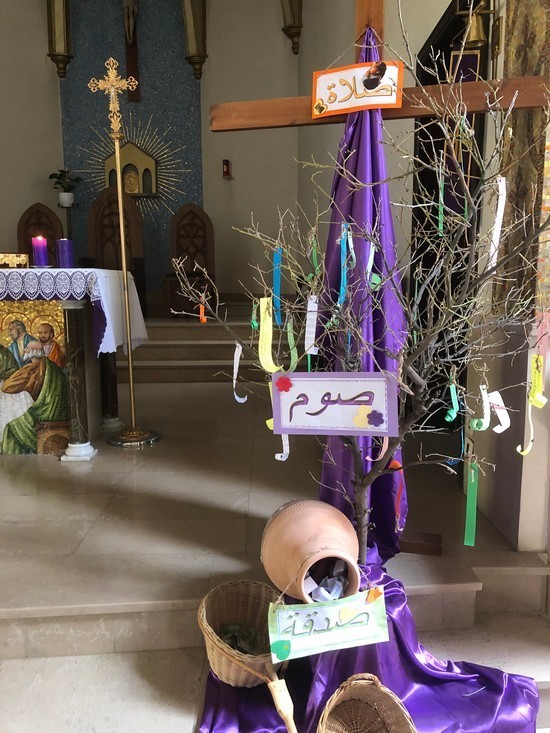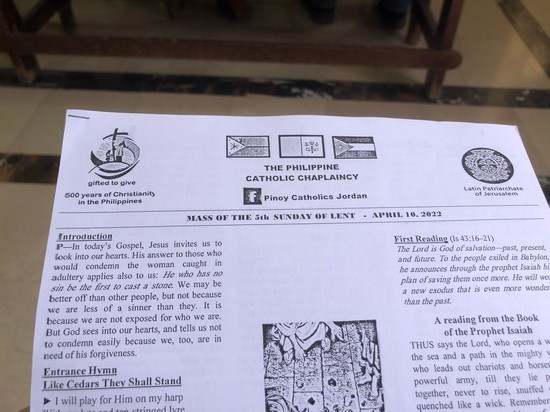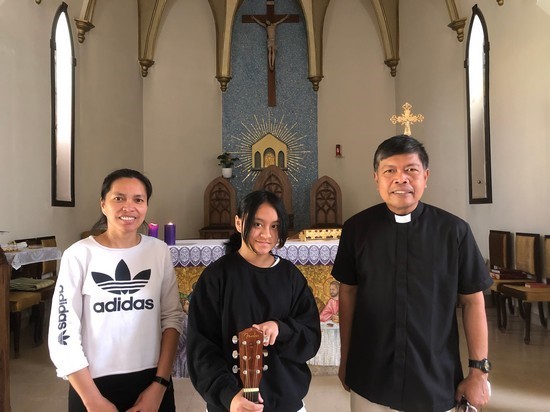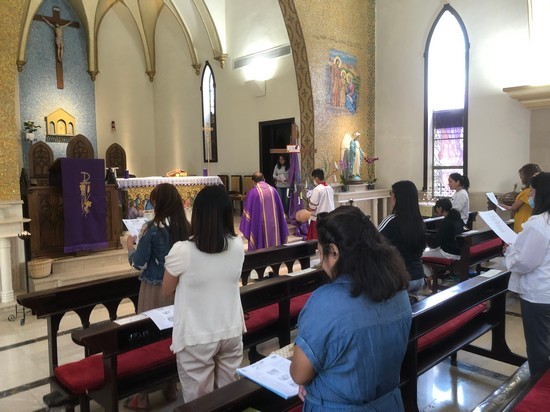Guitars are not a typical part of services in Arab Catholic
churches, but every Sunday, guitar music rings through the halls of the
Annunciation Church in
Jabal Al Weibdeh where El Shaddai Choir performs for a
largely foreign Catholic audience.
اضافة اعلان
The choir was founded by members of Amman’s growing
Filipino immigrant community. Filipino workers in Jordan can spend years or
even decades away from home. They have started to lay down roots through local
Catholic institutions, bringing a piece of the Philippines to the Kingdom and
creating a small home away from home.
“When you arrive in this country, even if you are
professionals, people (think) that you are just house maids,” said Melissa
Elemia, an immigrant from Mindanao who leads the choir.
 A Lenten Cross with the Arabic world for “prayer,” “fasting,” and “charity” at the Annunciation Church, Jabal Al Weibdeh, Amman.
A Lenten Cross with the Arabic world for “prayer,” “fasting,” and “charity” at the Annunciation Church, Jabal Al Weibdeh, Amman.
“Some in our community may live in difficult
circumstances, but we help each other, we are really one,” she added.
The Latin Catholic Patriarch of
Jerusalem recently
recognized the growing presence of Filipino Catholics in Jordan, setting up a
special chaplaincy for Filipino immigrants in 2017. Father Gerry Masangya, a
Filipino priest, currently serves as chaplain.
The choir is a branch of El Shaddai Fellowship, a
Catholic charismatic group that claims 8 million members in the Philippines
(and several in Amman).
Charismatic Catholicism is a movement that
emphasizes personal relationships with
Jesus Christ, connection to the Holy
Spirit, and emotional experiences. Founded in the US in the 1960s, the movement
soon spread around the world, particularly in non-European countries.
 The program for Philippine Catholic services at the Annunciation Church, Jabal Al Weibdeh, Amman on April 10, 2022.
The program for Philippine Catholic services at the Annunciation Church, Jabal Al Weibdeh, Amman on April 10, 2022.
Elemia said she joined El Shaddai Fellowship three
decades ago; “we are trying to help people hear the word of God”.
As a result of the coronavirus pandemic, Elemia and
her teenage daughter Jamcee took responsibility for music at church services
attended by Filipinos. (The previous musicians passed away or left Jordan
during the pandemic, she explained.) And so El Shaddai Choir was born.
On the second Sunday of Lent, I attended mass at the
Annunciation Church. The priest and the altar boy walked up to the pulpit to
the sound of Jamcee’s guitar and the singing of the congregation.
Sweet-sounding chords accompanied many parts of the service. The congregation
lined up for communion to the song Amazing Grace, then cleared out of the
church to another hymn.
 Father Gerry Masangya with Filipina choir leader Melissa Elemia and church guitarist Jamcee Elemia at the Annunciation Church, Jabal Al Weibdeh, Amman.
Father Gerry Masangya with Filipina choir leader Melissa Elemia and church guitarist Jamcee Elemia at the Annunciation Church, Jabal Al Weibdeh, Amman.
Masangya gave a sermon about the “complicated
situations” that migrant workers often find themselves in. He read a passage
from the
Book of John — “let him who is without sin cast the first stone” — and
explained that people in the community should not spread judgmental rumors
about each other’s conduct.
The service was in English rather than Tagalog, the Philippines
national language. That is because many immigrants from other communities come
to services at the church, according to Masangya.
The Filipino presence in Jordan has grown
dramatically over the past few decades. In 1990, the
Philippines restricted
Jordanian employers from recruiting Filipino workers, due to reports of worker
abuse. But after the restrictions were lifted in 2005, the Filipino diaspora in
Jordan grew dramatically.
The Jordanian government went from issuing 5,000
work permits for Filipino citizens in 2004 to 15,000 in 2009, according to a
2011 study by the Migration Policy Institute.

The Philippines Embassy’s records show that there
now are 26,000 to 28,000 Filipinos in Jordan, but Masangya says that official
statistics may not include the full picture, because many Filipinos work
illegally. In a speech last year, Philippines Ambassador Akmad Sakam estimated
that there are over 38,000 Filipinos in the Kingdom.
Father Gerry Masangya walks towards the pulpit at the beginning of Sunday mass at the Annunciation Church, Jabal Al Weibdeh, Amman on April 10, 2022.
Overall, the Filipino diaspora is one of the largest
in the world. The Philippines Department of Foreign Affairs estimated that
there were 7.9 million Filipinos abroad in 2015, nearly ten percent of the
total Philippines population.
“Filipinos are spread around the world… not only in
Asia, not only in America, but in the Middle East, Europe, and Africa as well,”
Masangya said.
“You name it, there’s a Philippine community!”
Masangya’s predecessor, Father Gerald Metal, left
Jordan to minister to Filipino workers on
Diego Garcia, a tiny Indian Ocean
island that serves as a British air base. Masangya came to Jordan in 2021,
after a brief stay in South Korea.
Many Filipinos in Jordan work as domestic help under
the kafala sponsorship system, which has been criticized for enabling
exploitative and even abusive working conditions. Even under a good employer,
doing manual labor thousands of miles away from home for years takes a toll on
workers.
To help meet the needs of the community, Filipino
diaspora leaders meet every Friday at the Pontifical Mission for
Palestine, the
local branch of the Catholic Near East Welfare Association in Jabal Hussein.
The mission is not just a place for Filipinos to
organize for their own interests, but also a way for the Filipino community to
give back to society.
Elisa Estrada, a Filipina lay member of the Teresian
Sisters, helps run the mission’s library, which serves as a community center
for immigrant and refugee communities from around the world. The Filipino
community meetings usually conclude with a meal open to members of the general
public. Unfortunately, the meals have been suspended due to the coronavirus
pandemic, according to Estrada.
The library now offers plates of onions and salt as
protection against the virus.
“Do not be surprised at the onions, it’s the natural
way,” Estrada said.
“Thank God, in three years we haven’t been
infected.”
Outside of religious services, the Filipino diaspora
also organizes weekend trips, volleyball matches, and disco nights. When
Jordan
News first spoke to Elemia, she was preparing for an El Shaddai outing to
Aqaba.
There is probably no better sign of how Filipinos
made Jordan a second home than Elemia’s daughter.
Jamcee speaks English and Arabic better than
Tagalog. She has visited the Philippines three times in her life — and had fun
every time — but feels that “Jordan, definitely Jordan” is more of a home.
“I just think about it as if I have two families,” Jamcee
said.
Read more Around Jordan
Jordan News




